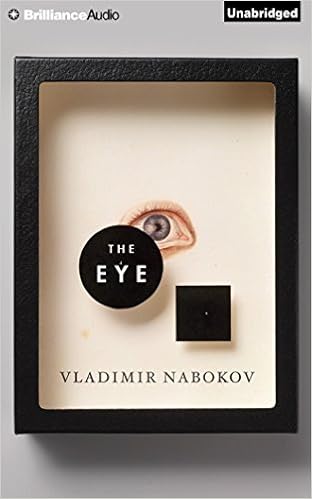by Scott Adlerberg
I just finished reading the Vladimir Nabokov novel The Eye. It's his fourth novel, written in 1930 in Russian when he was living in Berlin as part of the Russian emigre community. Later, with his son's help, as he did with all his books written first in Russian, Nabokov himself translated the book into English.
Now, literary magician that he is, prose stylist nonpareil, Vladimir Nabokov also happened to like using detective story conventions in his works. Crime and murder and odd forms of detection pop up in a number of his books. The Eye is one, Despair another. There are whole mystery novel plots described (for non-existent books of course) in The Real Life of Sebastian Knight, and the two greatest masterpieces of Nabokov's later years, Lolita and Pale Fire, both have murders at the core of their narratives. Not that Nabokov ever does anything conventional with the mystery form such as he has it in his books, but there's no question he liked the genre. Nabokov put Poe, Conan Doyle, and G.K. Chesterton among his favorite writers when he was a child, and when he was asked why, more than once, he had parodied detective novels, he said, "My boyhood passion for the Sherlock Holmes and Father Brown stories may yield some twisted clue."
Of all his novels, The Eye is the one most transparently like a detective story. In the introduction, Nabokov says this himself: "The texture of the tale mimics that of detective fiction, but actually the author disclaims all intention to trick, puzzle, fool, or otherwise deceive the reader. In fact, only the reader that catches on at once will derive genuine satisfaction from THE EYE."
Interesting, that last sentence. And now that I've read the novel, I know what Nabokov means. I may even read the book again (it's short enough to zip through quickly) just to appreciate how he worked his deception. But the one thing I would not do is rob a reader of the pleasure of enjoying some mystification while flipping through the book, and yet, that's exactly what the people who fashioned the back cover of the current Vintage Books edition did. The back cover describes the novel as a farcical detective story - true enough - and then tells you exactly the "solution" to the puzzle. The book is not a crime story - it involves a suicide, not a murder - but without doubt there is a "who is that" question to be solved. It's a novel, in part, that's an investigation into a person's identity. The disclosure comes near the very end of the book, so why would you want to give that away on the book's back cover?
The only answer I can come up with is that whoever did the cover saw no reason to treat the book like detective fiction, with a climactic surprise to be revealed, because they saw the novel as high literature. Which, to use that term in the accepted sense it's used, it is. But so what. That doesn't mean the writer's sense of play, his wanting to engage the reader through mystery and surprise, can't be respected? When Vintage puts out a straightforward detective novel, or a thriller, you can bet they don't give away the solution and twists on the cover. They'd never dream of doing that because they're dealing with what's considered "mere entertainment", and they know the fans of that entertainment would howl if they indulged in blatant spoilers. What's revealing here is the assumption that readers of Nabokov don't mind plot and character spoilers because readers of Nabokov don't come to the man for the things readers of "mere entertainments" come to a book for.
But is that actually so? Well, perhaps for some people (boobs), but for anyone who reads to experience a book spontaneously, surrendering to the craft and artistry and fun the writer has woven into that book, this idea is absolute nonsense. It's nonsense whether you're reading a pulp crime novel, a wild espionage thriller, or Vladimir Nabokov. Suspense, tension, plot tricks, carefully calibrated surprise - these are basic tools of the trade that even the purveyors of so-called high literature use. Does this even need to be pointed out? I would hope not. And I have a feeling that Nabokov, if he saw the cover giving away his main conceit, would be as annoyed with that spoiler as I am.


No comments:
Post a Comment